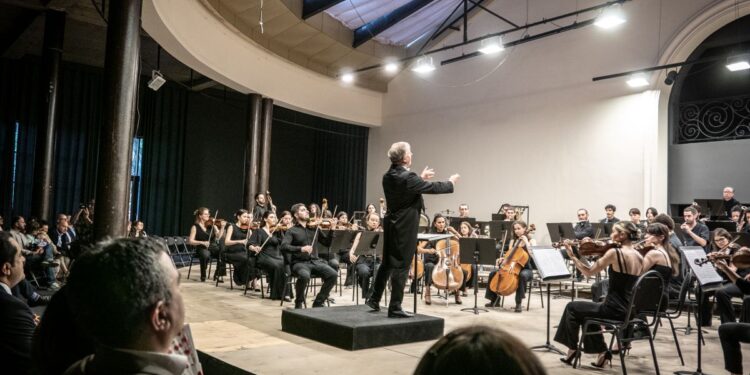A concert held in Tbilisi on June 21 brought together some of Poland’s leading classical musicians and Georgia’s foremost youth orchestra in an event marking the conclusion of Poland’s Presidency of the Council of the European Union. The performance featured pianist Marek Szlezer and cellist Jan Kalinowski — known internationally as the Cracow Duo — with the Giya Kancheli Tbilisi Youth Orchestra under the baton of Polish-British conductor Paweł Kotla.
The concert took place at the Tbilisi Auditorium and was organized with support from TEMIDA Arts & Business, Porta Musicae Artistic Association, the Embassy of the Republic of Poland in Tbilisi, and the Polish Institute Tbilisi. Funding came from the Polish Ministry of Foreign Affairs, as part of its “Public Diplomacy 2024–2025 – the European Dimension and Countering Disinformation” program.
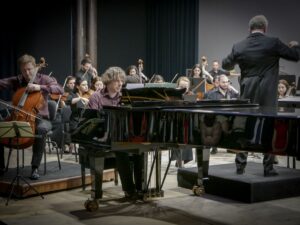
The repertoire combined Polish contemporary music with canonical European works. It included Three Pieces in Old Style by Henryk Mikołaj Górecki, Musica Concertante, Op. 130 by Krzysztof Meyer, and Beethoven’s Symphony No. 3 in E-flat major, the Eroica. The selection underscored the programmatic aim of the event: to highlight cultural dialogue between Poland and Georgia, and more broadly between EU member states and neighboring partners.
High-Level Polish Participation
The presence of the Cracow Duo, one of Poland’s most internationally active chamber ensembles, was a key feature of the program. Szlezer and Kalinowski have performed extensively across Europe, Asia, and the Americas, including concerts at Carnegie Hall, Amsterdam’s Concertgebouw, and the Seoul Arts Center. They are particularly known for championing Polish contemporary composers. Their recent album, Dedications vol. 2, was awarded a Global Music Award in 2025 in the Contemporary Classical category.
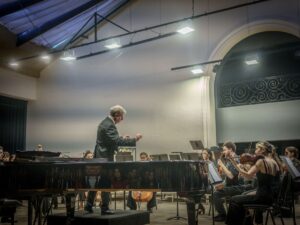
Their performance of Meyer’s Musica Concertante — a technically complex and structurally demanding work — was met with extended applause and stood out as the artistic centerpiece of the evening. It also served as a showcase of the Giya Kancheli Tbilisi Youth Orchestra’s technical discipline and adaptability under challenging repertoire.
The Orchestra and Its Role
The Giya Kancheli Tbilisi Youth Orchestra, founded in 2019, is Georgia’s only full-season professional youth orchestra. It has quickly established a profile beyond the country’s borders through appearances at events such as Young Euro Classic and the Tsinandali Festival. While still relatively young as an institution, it has already worked with a range of international conductors and soloists, and is increasingly seen as a platform for Georgia’s next generation of orchestral musicians.
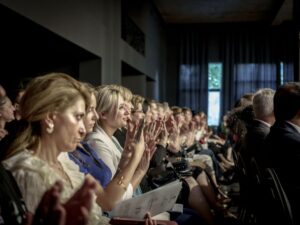
For this concert, the orchestra worked under the direction of Paweł Kotla, a conductor with a wide-ranging international profile. Kotla has led orchestras in Europe, Asia, and Latin America, and has appeared at leading venues including the Royal Albert Hall and the Berlin Philharmonic. He was recognized in 2024 with the honorary title “Meritorious for Polish Culture” by Poland’s Ministry of Culture. Earlier this year, he conducted the internationally broadcast “Concert of Freedom and Solidarity” in Kyiv, which was seen in dozens of countries.
In Tbilisi, Kotla’s leadership was marked by precision and clarity, particularly in the closing performance of Beethoven’s Eroica, which balanced orchestral power with tight structural control — an important factor given the youth of the ensemble and the historical weight of the piece.
Symbolic Context
Beyond its artistic merit, the concert carried symbolic weight. Scheduled to coincide with the conclusion of Poland’s six-month Presidency of the EU Council, the event highlighted Poland’s use of cultural diplomacy in its broader European policy. The theme of the Foreign Ministry’s grant program — focused on “the European Dimension and Countering Disinformation” — suggests a deliberate positioning of cultural events as tools in both soft power and informational outreach.
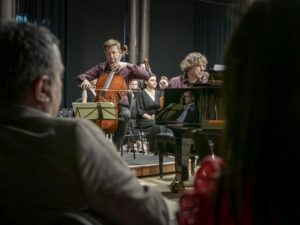
Georgia, which continues to deepen its institutional and cultural ties with the EU, served as a particularly appropriate host for the event. The presence of high-level Polish artists, combined with the participation of local talent, allowed for a visible expression of these shared ambitions. The format — featuring both established and emerging musicians — reinforced the message of continuity, mentorship, and partnership.
Institutional Partners and Diplomacy Through Culture
The concert was the result of collaboration between multiple Polish and Georgian cultural institutions. TEMIDA Arts & Business and Porta Musicae Artistic Association provided production and artistic support, while the Polish Embassy and the Polish Institute in Tbilisi played key diplomatic and logistical roles.
In recent years, Poland has intensified its cultural diplomacy in Eastern Europe and the South Caucasus, often aligning music, visual arts, and heritage programming with broader foreign policy goals. Saturday’s performance in Tbilisi follows this trajectory and is likely to be one of several such events marking the end of Poland’s EU Council Presidency.
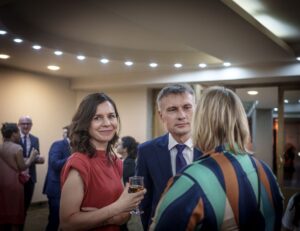
Looking Forward
For the young Georgian musicians of the Giya Kancheli Orchestra, the concert offered a rare opportunity to collaborate directly with internationally recognized soloists and an experienced conductor of global standing. For the Polish artists, it was a chance to reaffirm Poland’s cultural engagement abroad through performance, not rhetoric.
The result was an evening that met both artistic and diplomatic objectives — a well-executed concert that served as a visible expression of cultural cooperation between Poland and Georgia, and a reminder of the role music continues to play in European public life.

